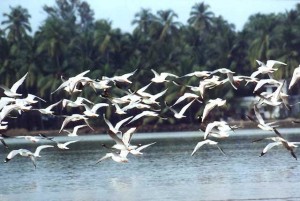World Migratory Bird Day 2024 shines a spotlight on the relationship between migratory birds and insects amidst alarming declines for both.

World Migratory Bird Day is a global campaign that educates and promotes conservation efforts for migratory birds and their journeys across borders. It raises awareness about the challenges birds face and encourages conservation actions worldwide.
World Migratory Bird Day triggers hundreds of educational events around the world that are united by their common goal of raising awareness and advocating for international bird protection. Each year the campaign features a central theme, prompts action, and coordinates global efforts to safeguard migratory birds and their habitats.
This year, the focus is on the importance of insects for migratory birds. Present in almost all the world’s ecosystems, insects are essential food sources for migratory birds on their long journeys. Migratory birds often time their migrations to align with insect abundance. They depend on these insects for food during migration stops and for breeding success and feeding their young.
The stark reality uncovered over recent years is that insect populations are declining, correlating with a decline in bird species reliant on insects for survival. An analysis in the journal Science revealed that we are losing roughly 9% of the world’s insect population each decade. Deforestation, industrial agriculture, the overuse of pesticides, light pollution, and climate change are major factors driving this trend (Reuters). Additionally, the United States and Canada have observed avian population declines, with a significant 29% drop in bird populations since 1970, equating to around 2.9 billion fewer birds.
This year’s World Migratory Bird Day theme, “Protect Insects, Protect Birds” is an opportunity to raise awareness of the importance of insects, to educate, and to learn. It coincides with rare and fascinating insect events, such as the double-brood cicada emergence in North America and the synchronous fireflies event in the Smoky Mountains National Park, likely to be occurring in late May or early June.
In other parts of the world, the migration of the “wandering glider” dragonfly (Pantala flavescens) stands out for its remarkable impact on the Amur Falcon’s (Falco amurensis) journey across Asia and Africa. While in Europe, the decline of the Pied Flycatcher (Ficedula hypoleuca) has been linked to climate-related food shortages, whereby the birds now frequently arrive in European forests after the caterpillars have matured into insects, which their chicks cannot eat. The consequence of this mistiming was already published in Nature in 2006.
To mark the day, the World Migratory Bird Day Campaign at the CMS and AEWA Secretariats is inviting people around the world to join in World Migratory Bird Day 2024 events and to take simple yet effective strategies to protect insects and birds.
Some examples of actions being encouraged through the campaign include:
- Planting native gardens to create suitable habitats for wildlife.
- Selecting organic products, thereby avoiding harmful pesticides.
- Reducing habitat destruction linked to property development or landscaping practice.
- Educating friends and family about the role insects play in our ecosystem.
- Supporting educational efforts aimed at insect conservation, including promoting their conservation at the community level.
- Creating laws and regulations to protect insects and migratory birds.
- Encouraging local conservation activities to maintain natural habitats for insects, birds, and other wildlife.
Events to celebrate World Migratory Bird Day, the phenomenon of bird migration, and the connections between birds and insects will take place across the world’s flyways on May 11, 2024.
Amy Fraenkel, Executive Secretary of the Convention on Migratory Species (CMS), said: “Insect populations are declining globally, and this is affecting many insect-eating migratory birds. While further research is needed to understand the extent of the problem, the decline of insects in many parts of the world is already having significant impacts on a range of migratory insectivorous species, especially bird and bat species. This has also recently been underlined by a CMS Report on Insects, presented at CMS COP14 in February 2024.”
Jacques Trouvilliez, Executive Secretary of the African-Eurasian Waterbird Agreement (AEWA), said: “Insects are key to the survival and breeding success of many migratory birds. These include some migratory waterbirds such as the Northern Bald Ibis and the Sociable Lapwing – both AEWA endangered species that are also featured on the global World Migratory Bird Day poster this year. Intensive use of pesticides is one of the main reasons for the decline of insect populations. By protecting insects, we protect our migratory birds.”
Jennifer George, Chief Executive at the East Asian-Australasian Flyway Partnership (EAAFP), said: “We cannot live without our six-legged friends, the insects. Outnumbering us humans, they may be small, scary, and often irritating, stinging and biting, but as a crucial part of the food chain, they are what our world relies on. They are especially important to birds, as they are nutritious, full of protein, and many rely solely on them for food. So, to keep our bird species alive, avoid pesticides, value mosquitoes, grow plants that flower, and spread the message – insects for life.”
Susan Bonfield, Executive Director of Environment for the Americas (EFTA), said: “This World Migratory Bird Day, we highlight the relationship between migratory birds and insects, emphasising the urgent need to protect them both. From the aerobatics of Cliff Swallows that capture insects in flight, to hummingbirds that feed them to their young, and the foraging of shorebirds that probe for insects in the sand and other habitats, it is evident that many birds rely on insects at various stages of their life cycles.
“Insects provide an essential source of energy for migratory birds, and the steep declines in grasshoppers, bees, butterflies, and other insects are a stark reminder that the conservation of birds depends on the successful protection of their insect prey. We invite you to join us in taking action to Protect Insects to Protect Birds.”
